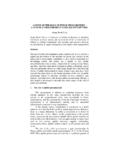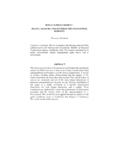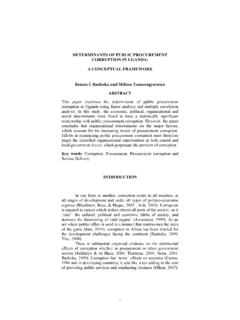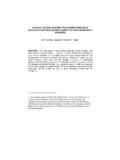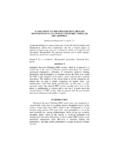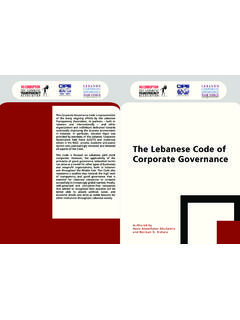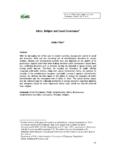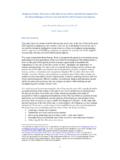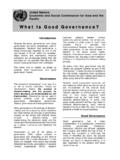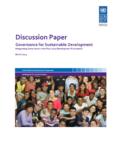Transcription of PUBLIC PROCUREMENT LAW IN BANGLADESH: …
1 PUBLIC PROCUREMENT LAW IN bangladesh : FROM. bureaucratisation TO accountability . Ridwanul Hoque Ridwanul Hoque, LLM (Chittagong), LLM (Cambridge), PhD (London), is an assistant professor of law at the University of Dhaka, Dhaka 1000, bangladesh . The author's main interests are in comparative PUBLIC law, judicial activism, corporate social responsibility, and good governance. He can be reached at: ABSTRACT. bangladesh 's PUBLIC PROCUREMENT law has sought to ensure transparency, accountability and fairness in government procurements. Whether its accountability -goal has been satisfactorily achieved is, however, a debatable issue. I will argue that the PROCUREMENT rules are somewhat de- effected both by bureaucratisation and technical avoidance of the rules.
2 On the other hand, the judiciary does not follow a searching review of PUBLIC contracts. In this background, I will analyse the Bangladeshi PROCUREMENT laws and practices with a view to fathoming accountability ' in PUBLIC procurements. I conclude by urging for simplified rules, more circumscribed administrative discretion, and a robust but principled judicial review of PROCUREMENT decisions. This has been a theoretical study, based on primary and secondary sources of knowledge. 1. INTRODUCTION. PUBLIC PROCUREMENT involves acquisition through contracts of goods, works, or services required by governments. In such a PUBLIC activity, therefore, transparency on the part of the given government is a higher value which PUBLIC law tends to promote.
3 In bangladesh , PUBLIC PROCUREMENT contracts have been a major source of corruption in the administration. bangladesh 's recent PUBLIC PROCUREMENT law, the PUBLIC PROCUREMENT Act 2006 (hereafter PPA), has thus sought to ensure transparency and accountability in PUBLIC contracts and fairness' to the participants in government or PUBLIC purchases. Despite the PROCUREMENT rules that have by and large followed international standards, 1 the accountability -goal of the Bangladeshi PROCUREMENT regime has not become optimally successful. As this paper shows, this might be attributed both to over- bureaucratisation of PROCUREMENT processes and technical avoidance of the rules themselves.
4 Also, in some cases, the discretion given to procuring entities in choosing one or the other methods of PROCUREMENT along with ineffective systems of appeals and review of PROCUREMENT decisions appears to be a potential defect in the system. On the other hand, the judiciary has not developed a searching review of PUBLIC contracts, thereby effectively leaving out certain government PROCUREMENT decisions out of the bounds of judicial constitutional review. In this backdrop, in what follows I analyse the Bangladeshi PROCUREMENT laws and attendant judicial responses, and to assess whether they have successful in attaining the goals of competition, accountability , and fairness in PUBLIC procurements.
5 At the outset, it needs to be mentioned that academic literature on PUBLIC PROCUREMENT in bangladesh seems to be almost non-existing. There actually is no scholarly writing on this important subject, apart from few reports and bare statues and rules, a gap which this paper seeks to address. Contrarily, this literature-gap is a factor that produces limitations for the present paper in that analyses below remain relatively new in bangladesh and without insights from pre-existing debates and resources. 2. THE PUBLIC PROCUREMENT REGIME IN bangladesh . There are no direct provisions in the Constitution of the People's Republic of Bangladesh2 that concern PUBLIC PROCUREMENT . Nor is there explicitly provided a right to honest and open governance.
6 The Constitution has, however, expressly entrenched such basic values as the rule of law, democracy, and justice, which can be interpreted to be the sources of PUBLIC obligation of integrity in state activities. Despite the absence of direct constitutional provisions, the institutional and legal frameworks for PUBLIC PROCUREMENT in bangladesh , which are of recent origin, can be seen to have derived their legitimacy from the Constitution of bangladesh . The Constitution vests the executive powers of the Republic in the Prime Minister, 3 who in the discharge of governance functions takes support and advice from a Cabinet. The Constitution, however, mandates that all powers of the state must be exercised on behalf of the people and only under the authority of the The executive organ of the state has thus the constitutional competency to enter into and award PUBLIC contracts for the purpose of procuring goods and services.
7 The above provisions of the Constitution and the nation's foundational values 5. 2. confirm that good governance (or rule of law) imperatives are constitutionally inherent, which undoubtedly bind the PUBLIC PROCUREMENT regime. Also importantly, the recently enacted Right to Information Act 2009,6 which requires an information delivery system to be set up in government departments and ensures the citizens' right to have information about their rights or entitlements, can be regarded a major contribution towards establishing a transparent PUBLIC PROCUREMENT regime. PUBLIC PROCUREMENT System in bangladesh is decentralized. However, while every single department can procure services or goods, it is the Ministry of Finance and the Ministry of Planning which have some distinct responsibilities vis- -vis PUBLIC PROCUREMENT .
8 7 For example, to facilitate an efficient and open system of PUBLIC PROCUREMENT in bangladesh the Central PROCUREMENT Technical Unit has been working since 2002, providing for, among other things, information and technical know-how required in PUBLIC procurements. 8 On the other hand, the Ministry of Finance issues, from time to time, instructions as to financial powers which PUBLIC entities may exercise in procuring goods or services. 2. 1 The Developments towards the PUBLIC PROCUREMENT Act 2006. Two principal legal instruments to deal with PUBLIC PROCUREMENT are the PUBLIC PROCUREMENT Act 2006 (PPA) 9 and PUBLIC PROCUREMENT Rules 2008 (PPR). Until the enactment of the PUBLIC PROCUREMENT Act in 2006, the legal regime of PUBLIC PROCUREMENT in bangladesh was based on procedures and practices that date back to the British era.
9 For example, the Compilation of General Financial Rules (CGFR), originally issued under the British rule, which broadly outlined the principles governing government contracts, remained the primary legal framework for PUBLIC contracts and procurements (World Bank, 2002).10 Building on CGFR. principles, several government departments and autonomous PUBLIC bodies and corporations developed their own rules and codes of practices for PUBLIC contracts and largesse to follow. 11 Interestingly, these regulations were greatly influenced by international development agencies and banks such as the World Bank, partly because Bangladeshi PUBLIC procurements tended to rely mostly on external Despite the fact that the primary objective of the pre-1996 legal instruments was to ensure openness and transparency in the PUBLIC PROCUREMENT system, the PROCUREMENT process that was in practice was far from satisfactory.
10 The following factors were widely regarded as having contributed to the then tardy and dilatory PROCUREMENT system: 3. poor advertisement, inadequate bidding period, poor specifications, nondisclosure of selection/competition criteria, award of contract by lottery without having developed the tools of attracting quality bidders, conclusion of one-sided contract documents, negotiation with all bidders, re-bidding without adequate grounds, corruption and outside influences such as political interventions, and, so on. 13 The so detected poor performance of the PUBLIC PROCUREMENT regime in bangladesh drew the attention of many including, as said, the international bodies. A World- Bank led assessment of the existing PUBLIC PROCUREMENT policy, legal frameworks, and institutions concluded with a finding of just-mentioned drawbacks in the PROCUREMENT .

